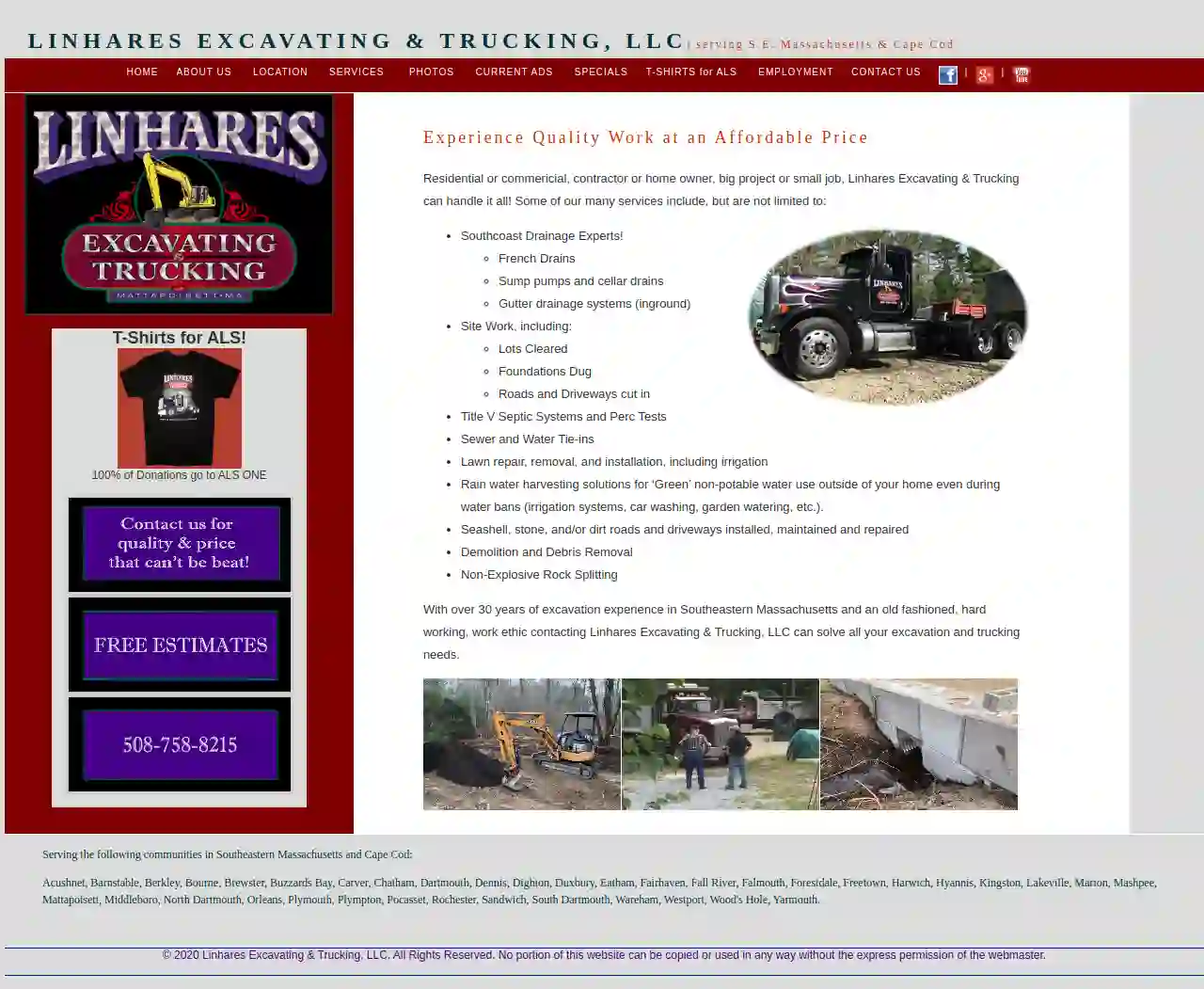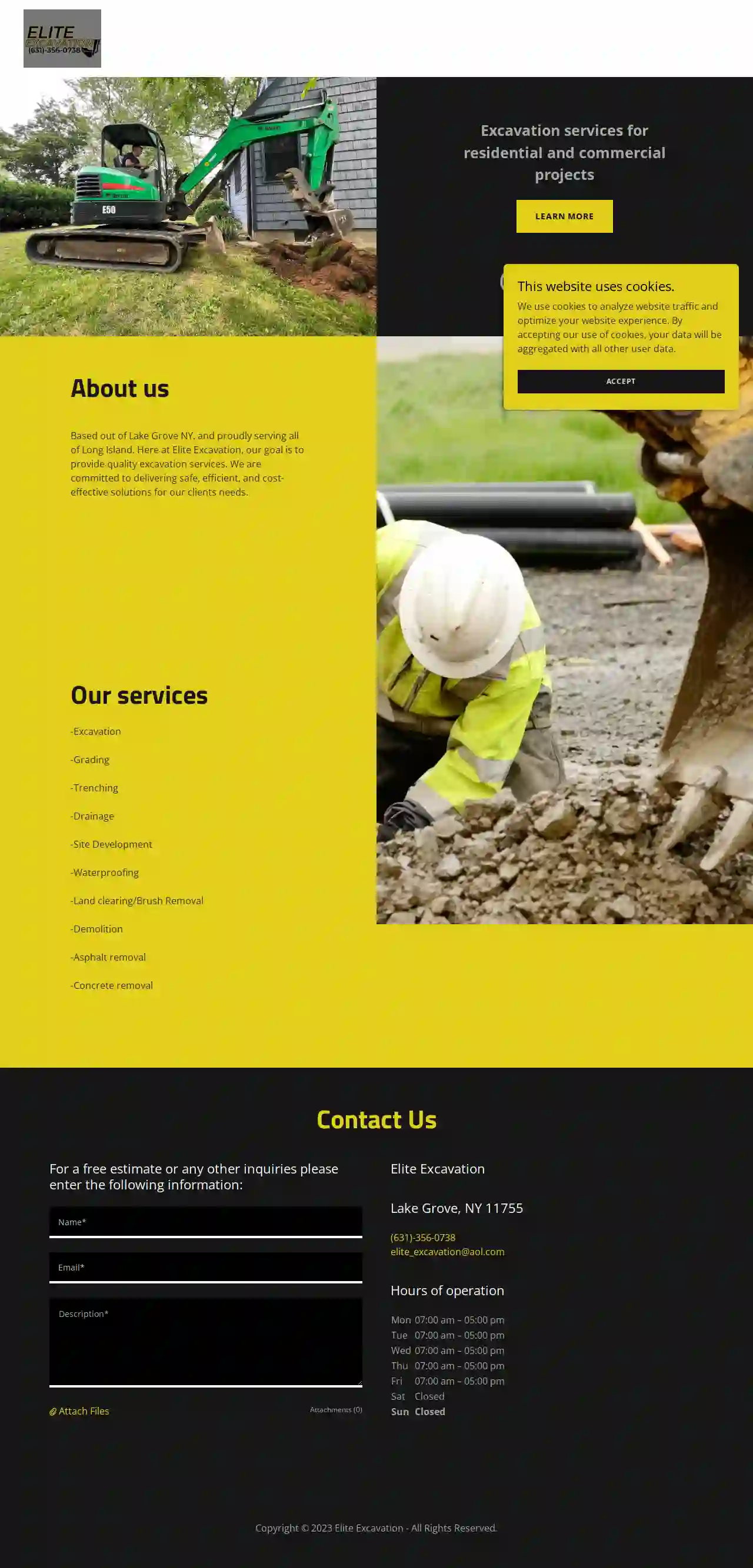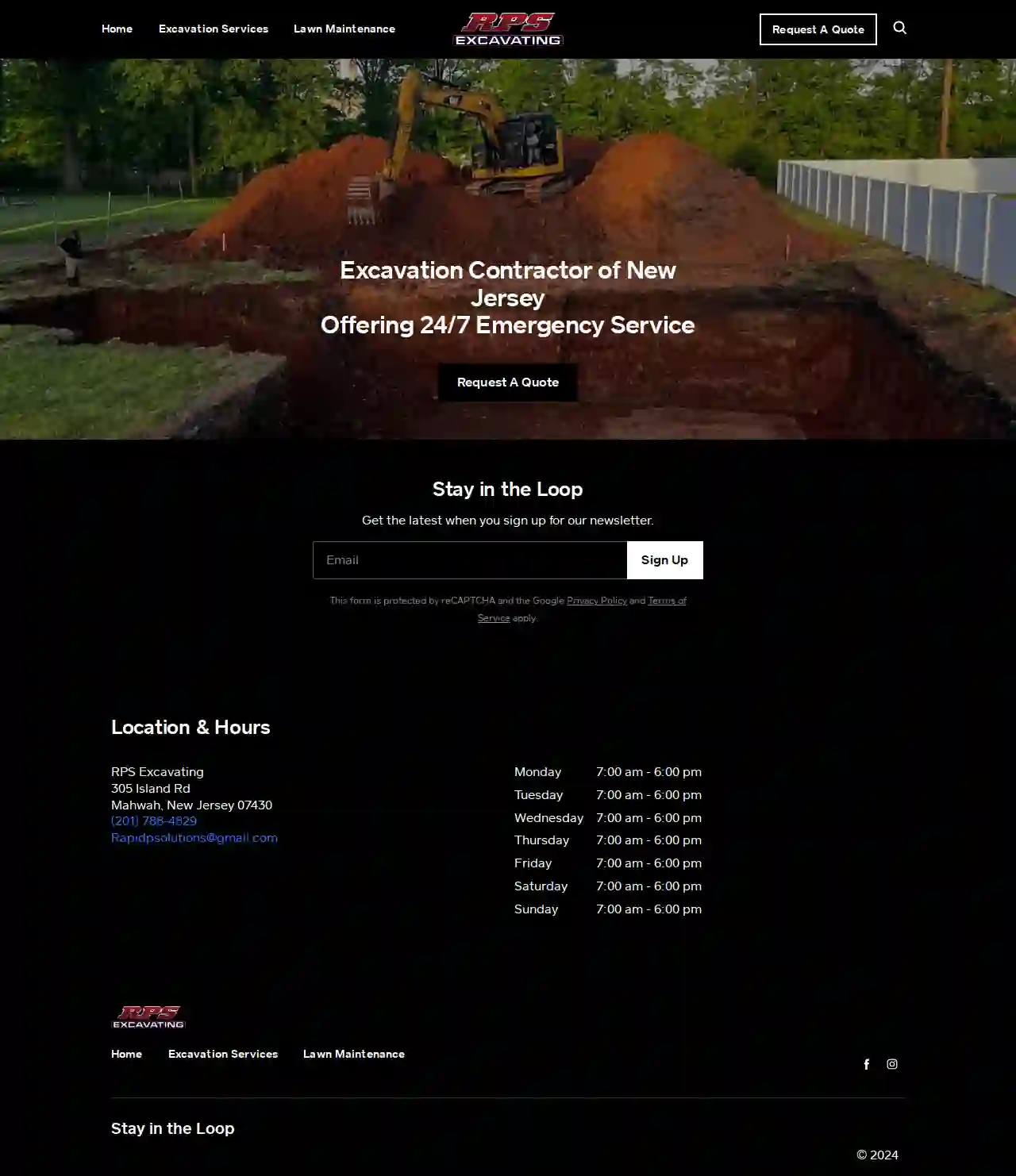Excavation Contractors Amsterdam
Top Trenching Services in Amsterdam
Receive multiple Excavation Companies quotes for your project today! Compare profiles, reviews, accreditations, portfolio, etc... and choose the best service.

Buraq Construction Inc
571 reviews1307 Foster Ave, Brooklyn, 11230, USAbout Us Buraq Construction Company was established to offer general construction business in New York City, and has been giving excellent service for more than 10 years. We are the specialists in luxury construction services of the highest standard and safety while keeping up the same standards and quality. Our experienced team is well-versed in navigating the complexities of city regulations and addressing violations efficiently and effectively.
- Services
- Why Us?
- Gallery
Get Quote
Linhares Excavating & Trucking, LLC
52 reviewsMattapoisett, USLinhares Excavating & Trucking, LLC: Your Trusted Partner for Excavation and Trucking Needs in Southeastern Massachusetts and Cape Cod For over 30 years, Linhares Excavating & Trucking, LLC has been a leading provider of excavation and trucking services in Southeastern Massachusetts and Cape Cod. We are a family-owned and operated business with a strong commitment to quality, customer satisfaction, and a dedication to providing our clients with the best possible experience. Whether you're a homeowner, contractor, or business owner, we have the expertise and resources to handle any project, big or small. Our team of experienced professionals is dedicated to providing you with the highest quality workmanship and exceptional customer service. We understand that your project is important to you, and we're committed to working with you every step of the way to ensure your complete satisfaction. We take pride in our commitment to safety and environmental responsibility. We use the latest equipment and techniques to ensure that all our projects are completed on time and within budget, while minimizing our impact on the environment. Contact us today for a free estimate and let us show you why Linhares Excavating & Trucking, LLC is the right choice for all your excavation and trucking needs.
- Services
- Why Us?
- Gallery
Get Quote
Elite Excavation
51 reviewsLake Grove, NY, 11755, USAbout us Based out of Lake Grove NY, and proudly serving all of Long Island. Here at Elite Excavation, our goal is to provide quality excavation services. We are committed to delivering safe, efficient, and cost-effective solutions for our clients' needs.
- Services
- Why Us?
- Gallery
Get Quote
Lehigh Construction Group, Inc.
4.26 reviews4327 S Taylor Road, Orchard Park, 14127, USProviding a full array of Construction, Maintenance and Repair Services to meet Client Construction Needs. A trusted commercial general contractor for Buffalo and WNY delivering construction services with two mainstay principles in mind: WORK HARD and TREAT PEOPLE RIGHT. Our team lives by these principles as we strive to deliver the best customer experience - safely & on-time. Smarter Solutions Providing clients with customized construction building services & emphasizing speed-to-market in an environment of trust, collaboration, and transparency for 40 years. Lehigh Project Building Repairs & Maintenance Lehigh PRO service vans are equipped to handle any small construction job. Lehigh PRO performs thousands of building repairs and facility maintenance jobs as one of Buffalo's trusted building repair and facility maintenance providers. Lehigh Pro Emergency Repairs Lehigh PRO emergency repair services provide quick-response maintenance & repair options. As general contractors, PRO crews take steps to ensure work is completed in a safe and timely manner. Lehigh Industrial Services Industrial Plant Small Construction The Lehigh Industrial Services team is fully equipped to handle any plant construction job and our industrial experience with concrete, steel & metal, masonry and sitework sets us apart. Customers include industrial manufacturing plants, chemical, pharmaceutical, agri-business and warehouse & distribution. Get to Know Lehigh Safety Safety is a Lehigh Core Value. Our philosophy remains unchanged – send everyone home safely to their family every day. We remain on the cutting edge of construction industry safety standards and practices by maintaining our commitment to training and educating employees so they perform in the safest manner possible. History Lehigh Construction Group, Inc. was founded in 1984 by Dave Knauss and Tom Glomb as commercial general contractors for Buffalo and Western New York businesses. Over 40 years later we have grown into one of Buffalo’s most trusted commercial general contractors, offering a full array of commercial construction services. From small scale building maintenance repairs to new-builds & plant additions, Lehigh provides expertise in all aspects of construction. Let us be your commercial general contractor.
- Services
- Why Us?
- Gallery
Get Quote
EAGL Construction Group LLC
52 reviewsBrooklyn, USEAGL Construction Group is a Brooklyn-based Design/Build Construction and Development company. We specialize in a wide range of services, from custom kitchen design and installation to bathroom renovations, hardwood flooring, and more. We also offer general contracting, development, excavation, and extensions for both residential and commercial projects. Our team of experienced professionals is dedicated to providing our clients with the highest quality workmanship and customer service. We are fully licensed and insured, and we are committed to exceeding your expectations. Whether you are looking to renovate your bathroom, build a new kitchen, or simply need help with a small repair, EAGL Construction Group is here to help. Contact us today for a free consultation.
- Services
- Why Us?
- Gallery
Get Quote
Yankels Demolition
3.713 reviews341A Wallabout St, Brooklyn, 11206, USGold Standard in Demolition and Waste Management We are a licensed, bonded and insured company headquartered in Brooklyn, and serving the Tri State area. Yankel’s received a Buildzoom score of 104, placing us in the top 10th percentile of nearly 80,000 contractors nationwide. Look us up on Buildzoom.com under Atweek, Inc. Also read about us in our recent feature article in the Business Talk section of AMI Magazine. Where we Started YANKEL’S was founded in 1999 by Yehoshua Werzberger with only a small Ford Pick-up truck and a big vision. The Pick-up has since been replaced with an impressive fleet of trucks and mobile machinery; the big vision is still here, as is the personal touch. Having done all the leg work as he started and grew his business, Yehoshua has intimate knowledge of the work involved in every division of the company. Now at the helm of a full- service corporation and running one of the largest waste management facilities in the New York region, Yehoshua is still actively involved in every project. Why Choose Us We hold our customers in the highest regard, and their satisfaction drives every decision we make. Expect personalized attention, responsive communication, and a team that goes the extra mile to understand and fulfill your needs. Highly skilled and experienced professionals who are experts in their field. From project planning to execution, our team’s knowledge and expertise ensures a safe and successful demolition, meeting all necessary regulations and standards. We recognize the importance of delivering prompt results. With an unwavering commitment to efficiency, we execute every demolition with precision and speed, allowing you to move forward with your plans quickly and confidently. Reliability is the cornerstone of our reputation. Count on us to be there when you need us, delivering consistent and dependable services that you can trust. Our experience speaks for itself, and we aim to exceed your expectations every step of the way.
- Services
- Why Us?
- Testimonials
- Gallery
Get Quote
Shackelford Construction and Hauling, LLC
4.76 reviews350 South Industrial Parkway, Yazoo City, USAbout Us Shackelford Construction and Hauling, LLC is a Mississippi-based construction company, with additional offices in Houston, TX, and yards located in New Mexico, Texas, South Carolina, and Georgia. We specialize in a range of services including land clearing, demolition, excavation, grading, soil stabilization, storm drainage, stone placement, concrete, building, and site maintenance for the railroad, oilfield, energy, industrial, and large commercial industries. Our top priorities are safety and customer satisfaction. Shackelford is licensed to operate in 30 states across the United States on individual projects up to 55 million dollars. Our client list ranges from all class 1 railroads and privately-owned short lines to oil and gas, chemical, industrial, and energy. Our Mission Finish every job ahead of schedule and without incident, allowing our customers the earliest possible financial return on their investment. Team Jay Shackelford Owner 38 years of experience Hunter Shackelford Operations Manager 26 years of experience Alfonzo Hernandez Safety Manager 26 years of experience Reeves Shackelford Manager of Estimating & Project Management 27 years of experience Clint Shackelford Business Development 14 years of experience Reeves Shackelford Estimating & Project Management
- Services
- Why Us?
- Our Team
- Gallery
Get Quote
Ground Control Excavating Inc.
3.73 reviewsWarwick, USComplete Site Development, Excavation, & More… We provide complete land and site development services for projects of all sizes, including government, commercial, public, private, emergency, and residential projects. Ground Control Excavating, Inc. offers complete excavation services for residential and commercial projects. A premiere land-site excavating contractor, as well as, first-responder for emergencies and natural disasters in the NY area, we are committed to providing the highest level of quality to our customers throughout Orange, Sullivan, Rockland, Westchester counties and the entire Hudson Valley, NY area. GCE is based out of Warwick, NY. We provide complete site development, road development, rock hammering, rock crushing, concrete recycling, underground utilities, septic systems, drainage, top soil, and much more. We service Warwick, Monroe, Middletown, Goshen, Newburgh and the entire Hudson Valley. Experienced Construction Professionals We will work with you to achieve a common goal on time and on budget!
- Services
- Why Us?
- Gallery
Get Quote
The State Group Industrial USA Ltd
54 reviews810 Crescent Centre Drive, Suite 280, 810 Crescent Centre Drive Suite 280, Franklin, 37067, USThe State Group: Mission Critical Multi-Trade Services For over 60 years, The State Group has been a leading multi-trade service contractor on projects, maintenance, and service throughout the United States and Canada. We are committed to providing our clients with the highest quality services, delivered safely and efficiently. Our team of highly skilled professionals has a wealth of experience in a diverse range of industries, including power, renewable energy, electric vehicle/automotive, mission critical, manufacturing, metals & mining, energy, chemical processing, food and beverage processing, and commercial and institutional. Our Values Our values are the foundation of everything we do. We are committed to: Safety: Our commitment is Everyone Goes Home Safe. Quality: We strive for excellence in everything we do. Integrity: We are honest and ethical in all our dealings. Teamwork: We work together to achieve our goals. Innovation: We are constantly seeking new and better ways to serve our clients. Our People Our people are our greatest asset. We are committed to providing our employees with a safe and rewarding work environment. We offer competitive salaries and benefits, as well as opportunities for professional development. If you are looking for a challenging and rewarding career, we encourage you to apply.
- Services
- Why Us?
- Gallery
Get Quote
RPS Excavating
518 reviews10000 County Rd 12, Seaforth, N0L 1P0, USAbout RPS Excavating RPS Excavating is a family-owned and operated business with over 20 years of experience in the excavating industry. We are committed to providing our clients with high-quality services at competitive prices. We specialize in a wide range of excavating services, including: Site preparation Grading Demolition Utility installation Drainage And more! We are fully licensed and insured, and we have a team of experienced and qualified professionals who are dedicated to providing our clients with the best possible service. We are committed to safety and environmental responsibility, and we always strive to exceed our clients' expectations. Contact us today for a free estimate!
- Services
- Why Us?
Get Quote
Over 22,076+ Excavation Pros in our network
Our excavation pros operate in Amsterdam & surroundings!
ExcavationHQ has curated and vetted Top Excavation Companies near Amsterdam. Find the most trustworthy business today.
Frequently Asked Questions About Excavation Contractors
- Determine the Area: Measure the length and width of the area you want to fill. Multiply them to get the area in square feet (or meters).
- Determine the Depth: Measure the difference between the existing grade and the desired grade (how much you need to raise the ground). This is the depth of fill required.
- Calculate Volume: Multiply the area (step 1) by the depth (step 2) to get the volume in cubic feet (or meters).
- Account for Compaction: Fill dirt compacts when it settles, so add 10% to 25% to the calculated volume to account for compaction. The exact percentage depends on the type of fill material.
- Excavations Deeper Than a Certain Depth: This varies by jurisdiction, usually around 5 feet.
- Excavations Near Utilities: Digging near buried utilities (gas, water, electric) often requires permits and utility locates to prevent damage.
- Excavations Affecting Public Property: Projects impacting sidewalks, roads, or other public areas typically require permits.
- Excavations in Environmentally Sensitive Areas: Projects in wetlands, floodplains, or other sensitive areas might need special permits.
- Project Type and Size: Ensure the contractor has experience handling projects similar to yours in scale and complexity.
- Reputation and Reviews: Check online reviews and testimonials, and request references from previous clients.
- Licensing and Insurance: Verify that the contractor is properly licensed and insured to protect you from liability.
- Equipment and Resources: Confirm that they have the necessary equipment and resources for your project's needs.
- Communication and Transparency: Choose a contractor who communicates clearly, provides detailed estimates, and keeps you informed throughout the project.
- Safety Record: Inquire about their safety protocols and track record to ensure a safe work environment.
- Price: While price is important, it shouldn't be the only deciding factor. Balance affordability with experience, reputation, and quality of service.
What is the difference between topsoil and subsoil?
Topsoil: The uppermost layer, typically rich in organic matter, nutrients, and microorganisms. It's essential for plant growth and is often darker in color.
Subsoil: The layer beneath the topsoil, containing less organic matter and generally denser. It provides support for roots but is less fertile than topsoil.
During excavation, topsoil is often removed and preserved separately for later use in landscaping, while subsoil is typically used for backfilling or other less demanding applications.
How do I calculate how much dirt I need for fill?
Do I need a permit for excavation?
How do I choose the right excavation contractor for my project?
What is the difference between topsoil and subsoil?
Topsoil: The uppermost layer, typically rich in organic matter, nutrients, and microorganisms. It's essential for plant growth and is often darker in color.
Subsoil: The layer beneath the topsoil, containing less organic matter and generally denser. It provides support for roots but is less fertile than topsoil.
During excavation, topsoil is often removed and preserved separately for later use in landscaping, while subsoil is typically used for backfilling or other less demanding applications.
How do I calculate how much dirt I need for fill?
- Determine the Area: Measure the length and width of the area you want to fill. Multiply them to get the area in square feet (or meters).
- Determine the Depth: Measure the difference between the existing grade and the desired grade (how much you need to raise the ground). This is the depth of fill required.
- Calculate Volume: Multiply the area (step 1) by the depth (step 2) to get the volume in cubic feet (or meters).
- Account for Compaction: Fill dirt compacts when it settles, so add 10% to 25% to the calculated volume to account for compaction. The exact percentage depends on the type of fill material.
Do I need a permit for excavation?
- Excavations Deeper Than a Certain Depth: This varies by jurisdiction, usually around 5 feet.
- Excavations Near Utilities: Digging near buried utilities (gas, water, electric) often requires permits and utility locates to prevent damage.
- Excavations Affecting Public Property: Projects impacting sidewalks, roads, or other public areas typically require permits.
- Excavations in Environmentally Sensitive Areas: Projects in wetlands, floodplains, or other sensitive areas might need special permits.
How do I choose the right excavation contractor for my project?
- Project Type and Size: Ensure the contractor has experience handling projects similar to yours in scale and complexity.
- Reputation and Reviews: Check online reviews and testimonials, and request references from previous clients.
- Licensing and Insurance: Verify that the contractor is properly licensed and insured to protect you from liability.
- Equipment and Resources: Confirm that they have the necessary equipment and resources for your project's needs.
- Communication and Transparency: Choose a contractor who communicates clearly, provides detailed estimates, and keeps you informed throughout the project.
- Safety Record: Inquire about their safety protocols and track record to ensure a safe work environment.
- Price: While price is important, it shouldn't be the only deciding factor. Balance affordability with experience, reputation, and quality of service.